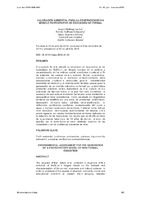Mostrar el registro sencillo del ítem
Valoración ambiental para la generación de un modelo participativo de educación no formal
| dc.contributor.author | Villadiego-Lorduy, Jorge | |
| dc.contributor.author | Huffman-Schwocho, Dennis | |
| dc.contributor.author | Guerrero-Gómez, Stalyn | |
| dc.contributor.author | Rivero-Espitia, Sandra | |
| dc.contributor.author | Cortecero-Bossio, Adolfo | |
| dc.date.accessioned | 2018-03-01T20:48:58Z | |
| dc.date.available | 2018-03-01T20:48:58Z | |
| dc.date.issued | 2015 | |
| dc.identifier | https://www.scielo.org.co/scielo.php?pid=S1909-24742015000200010&script=sci_abstract&tlng=pt | es |
| dc.identifier.citation | Villadiego-Lorduy, J., Huffman-Schwocho, D., Guerrero-Gómez, S., Rivero-Espitia, S., & Cortecero-Bossio, A. (2015). Valoración ambiental para la generación de un modelo participativo de educación no formal. Revista Luna Azul, 0(41), 165-183. | es |
| dc.identifier.issn | 1909-2474 | |
| dc.identifier.uri | https://hdl.handle.net/2238/9618 | |
| dc.description | Artículo científico | es |
| dc.description.abstract | The purpose of this article is to establish a diagnosis of the wetlands of Bañó and Negros based on the analysis and characterization of the social, economic and natural spheres in order to understand the causes of physical, economic, social and educational events that explain the destaging between perceptions and cultures adequate for the environmental sustainability of the territory and the consideration of such causes for the generation of a non-formal educational system. The existing environmental problem in the wetlands of Bañó and Negros is the result of the pressures of anthropic type they have been submitted to, the absence of an environmental culture has led residents to unbalance the ecosystems in mention. As a result of the territorial diagnosis, a number of environmental problems ranging from desiccation of wetlands, loss of biodiversity, poor sanitary conditions, soil and water pollution to inappropriate waste management were identified. Factors such as a low level of education, limited employment opportunities and little household income affect indirectly the deterioration of wetlands. It's important to note that 85,8% of the total population has been living in the study area for more than 16 years. Therefore they have a broad knowledge of the wetlands and of the problems present in them. | es |
| dc.language.iso | spa | es |
| dc.relation.hasversion | https://dx.doi.org/10.17151/luaz.2015.41.10. | es |
| dc.rights | acceso abierto | es |
| dc.rights.uri | https://creativecommons.org/licenses/by-nc-sa/4.0/ | * |
| dc.source | Revista Luna Azul | es |
| dc.subject | Problemas | es |
| dc.subject | Educación | es |
| dc.subject | Pobreza | es |
| dc.subject | Humedales | es |
| dc.subject | Condición ambiental | es |
| dc.subject | Research Subject Categories::SOCIAL SCIENCES::Social sciences::Education | es |
| dc.title | Valoración ambiental para la generación de un modelo participativo de educación no formal | es |
| dc.type | artículo original | es |
Ficheros en el ítem
Este ítem aparece en la(s) siguiente(s) colección(ones)
-
Artículos [9]



